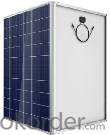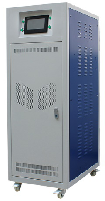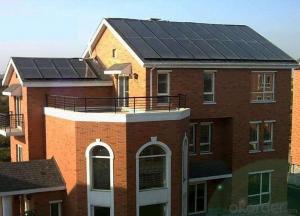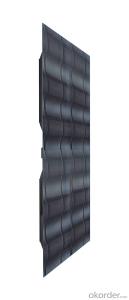25kw Solar Off-grid Power System solar energy
- Loading Port:
- China main port
- Payment Terms:
- TT OR LC
- Min Order Qty:
- 1 set
- Supply Capability:
- 500 set/month
OKorder Service Pledge
OKorder Financial Service
You Might Also Like
Item specifice
1. Technical parameters of 5kw Solar Off-grid Power System 25KW
-Solar panels
Power(Pmax): 380 Wp
Dimension: 1956x992x40 mm
Working Voltage(Voc): 44.6V
Working Current(Imp):9.32A
Weight: 23 kg
- PV Inverter with controller
Efficiency: >85%
Pure sine wave
AC 220V/380V 50/60Hz output
Working Temp: 0℃~40℃
Battery overvoltage protection,undervoltage protection,overload protection,short circuit protection, overtemperature protection,etc.
900*700*1750mm 315KG
-Mounting Bracket
Flat roof or Ground: Galvanized steel type;
Tile roof: Aluminium type
Wind Load Resistanc: 45m/s
Snow Load: 2kN/m2
-GEL Battery of 12V 250Ah
520*269*228mm 68.5KG
-DC Cables
PV1-F
TUV/UL certificates
2. Products images


3. Product list
| No. | Item |
| 1 | Solar Panels |
| 2 | PV Inverter with controller built-in |
| 3 | Controller |
| 4 | Mounting racks |
| 5 | DC Cables |
| 6 | AC Cables |
| 7 | MC4 Connectors |
| 8 | GEL Battery |
| 9 | Combiner Box |
| 10 | Distribution box |
4. Remark
- In rainy days, the battery can support10000W load work 13hours.
-The maximum power load should not exceed 10.5KW (including inductive load impact: such as refrigerators, air conditioners, washing machines, etc. with motor load).
- The battery can be fully charged in 10-12hours under STC sunshine condition.
5. Package
Wooden case or carton pallet packing


- Q:Can solar energy systems be used in powering hotels or resorts?
- Yes, solar energy systems can certainly be used to power hotels or resorts. Solar power is a clean and renewable energy source that can provide ample electricity to meet the energy demands of hotels and resorts. These establishments typically require a significant amount of energy for various purposes such as lighting, heating, cooling, and operating electrical appliances and equipment. Installing solar panels on the rooftops or in open areas of hotels and resorts can allow them to harness the abundant sunlight and convert it into electricity. This electricity can be used to power the entire facility, reducing the reliance on traditional energy sources and lowering the carbon footprint. In addition to being environmentally friendly, solar energy systems can also provide financial benefits to hotels and resorts. By generating their own electricity, these establishments can reduce or even eliminate their utility bills, resulting in substantial cost savings over time. Moreover, some countries offer incentives, grants, or tax credits for implementing solar power systems, further enhancing the economic viability of such installations. Furthermore, the availability of solar energy is not limited to sunny days. With advancements in technology, solar panels can still generate electricity even during cloudy or overcast conditions. Additionally, excess energy produced during peak sunlight hours can be stored in batteries for later use, ensuring a consistent power supply throughout the day and night. By adopting solar energy systems, hotels and resorts can showcase their commitment to sustainability and environmental responsibility. This can be a valuable marketing tool, attracting eco-conscious guests who prefer environmentally friendly accommodations. It also aligns with the growing trend of sustainable tourism, which can enhance the reputation and competitiveness of these establishments in the industry. Overall, solar energy systems are a viable and efficient solution for powering hotels and resorts. They offer numerous benefits, including reduced utility costs, environmental sustainability, and enhanced market appeal. As the technology continues to evolve and become more affordable, more and more hotels and resorts are embracing solar power as a clean and reliable energy source.
- Q:What is the impact of dust storms on solar panels?
- Dust storms can have a negative impact on solar panels as they can reduce the panels' efficiency by blocking sunlight and reducing the amount of energy they can generate. The accumulation of dust on the panels can also lead to overheating, which can further decrease their performance and potentially damage the panels if not cleaned regularly.
- Q:Can solar energy systems be used for water purification?
- Yes, solar energy systems can be used for water purification. Solar-powered water purification systems use sunlight to generate heat or electricity, which is then used to treat water by eliminating contaminants, such as bacteria, viruses, and chemicals. These systems are eco-friendly, cost-effective, and can be particularly useful in remote areas where access to clean water is limited.
- Q:How does the efficiency of solar panels vary based on the manufacturer?
- Solar panels' efficiency varies depending on the manufacturer due to several factors. One significant factor is the quality of materials utilized in their production. Manufacturers may employ different types of silicon, the primary material in most solar panels. Utilizing high-quality silicon enhances the panels' ability to capture and convert sunlight into electricity, resulting in increased efficiency. The manufacturing process itself also plays a role. Each manufacturer may employ distinct techniques and technologies. Advanced manufacturing processes lead to more precise and uniform panel construction, reducing energy conversion losses and improving overall efficiency. Investments in research and development are crucial. Manufacturers that continuously invest in research and development can develop innovative technologies, such as anti-reflective coatings or multi-junction cells, significantly enhancing panel efficiency. Furthermore, manufacturers differ in the size and design of their panels. Larger panels with more surface area capture more sunlight, while innovative designs optimize energy absorption and minimize losses due to shading or environmental factors. These differences impact panel efficiency. Lastly, the reputation and experience of a manufacturer also influence panel efficiency. Established manufacturers with a history of producing high-quality and efficient panels refine their production processes and incorporate lessons learned from previous models, resulting in improved efficiency. In conclusion, solar panel efficiency varies based on the manufacturer due to differences in materials, manufacturing processes, research and development efforts, panel size and design, as well as the reputation and experience of the manufacturer. Consumers should thoroughly research and compare different manufacturers to select panels with the highest efficiency suitable for their specific needs.
- Q:Are there any tax benefits for installing a solar energy system?
- Yes, there are several tax benefits for installing a solar energy system. One of the main benefits is the federal investment tax credit (ITC). The ITC allows homeowners and businesses to deduct a percentage of the cost of their solar energy system from their federal taxes. As of 2021, the ITC provides a 26% tax credit for residential systems and commercial systems. Additionally, some states offer their own tax incentives for solar energy installations. These incentives may include property tax exemptions, sales tax exemptions, or state tax credits. The availability and amount of these incentives vary from state to state, so it is important to research the specific incentives available in your area. Furthermore, installing a solar energy system can also increase the value of your property. Several studies have shown that homes with solar panels sell for a premium compared to homes without them. This increase in property value can have long-term financial benefits. It is recommended to consult with a tax professional or an expert in solar energy to fully understand and take advantage of all the tax benefits available for installing a solar energy system.
- Q:Can solar panels be installed on floating platforms or buoys in bodies of water?
- Yes, solar panels can be installed on floating platforms or buoys in bodies of water. Floating solar, also known as floating photovoltaic (FPV) systems, are becoming increasingly popular due to their numerous advantages such as increased energy production, reduced land usage, and minimized water evaporation. These platforms or buoys are designed to withstand water conditions and can be installed in lakes, reservoirs, and even offshore.
- Q:Can solar energy systems be used in areas with limited roof space due to chimneys or vents?
- Indeed, solar energy systems can still function effectively in areas where roof space is restricted due to chimneys or vents. Although solar panels typically require unobstructed roof space to achieve optimal efficiency, there are alternative solutions accessible for areas with limited roof space. One feasible approach involves installing solar panels on adjacent flat or sloped surfaces, such as the ground or a nearby wall. These ground-mounted or wall-mounted solar systems can be adjusted to maximize exposure to sunlight, ensuring that the panels generate a substantial amount of energy. Another solution entails utilizing solar technologies specifically designed for limited roof space. For instance, solar tiles can be seamlessly integrated into the roof itself, replacing conventional roofing materials while simultaneously harnessing solar energy. These solar tiles can be installed around chimneys, vents, or any other obstructions on the roof, efficiently utilizing the available space. Furthermore, solar energy systems can be combined with other renewable energy sources, such as wind turbines or geothermal systems, to compensate for the limited roof space. By diversifying the sources of renewable energy, it becomes possible to meet the energy requirements of an area even with restricted roof space. In conclusion, despite the challenges posed by limited roof space due to chimneys or vents, there are still viable options for employing solar energy systems. By exploring alternative mounting options, utilizing solar tiles, or combining solar with other renewable energy sources, it becomes feasible to harness solar power in areas with restricted roof space.
- Q:Can solar energy systems generate power at night?
- No, solar energy systems cannot generate power at night because they rely on sunlight to generate electricity.
- Q:How do solar energy systems affect the environment?
- Solar energy systems have a significantly positive impact on the environment. They are a renewable and clean source of energy, which means they do not produce harmful emissions or contribute to air pollution. This reduces the overall greenhouse gas emissions and helps combat climate change. Additionally, these systems do not require water for operation, unlike traditional fossil fuel power plants, reducing water scarcity issues in certain regions. Furthermore, solar energy systems have a minimal impact on land use. Rooftop solar panels can be installed on existing structures, maximizing the use of space and minimizing the need for additional land. Moreover, solar farms can be constructed on marginal or unused land, without disrupting natural habitats or valuable ecosystems. Solar energy systems also have a positive effect on human health. The reduction in air pollution and emissions from traditional energy sources leads to improved air quality, resulting in fewer respiratory and cardiovascular diseases. This, in turn, reduces healthcare costs and improves overall well-being. Another significant advantage of solar energy systems is their potential to create jobs and stimulate economic growth. The installation, maintenance, and manufacturing of solar panels require a skilled workforce, leading to the creation of new employment opportunities. Additionally, investing in solar energy infrastructure can help diversify the energy sector, reducing dependence on imported fuels and increasing energy security. While solar energy systems offer numerous environmental benefits, it is important to consider their potential challenges. The production and disposal of solar panels can have some environmental impact, primarily due to the use of certain materials during manufacturing. However, advancements in technology and recycling programs are continuously reducing these concerns. In conclusion, solar energy systems have a positive influence on the environment by reducing greenhouse gas emissions, minimizing air and water pollution, conserving land resources, improving human health, and stimulating economic growth. As we transition towards a more sustainable future, solar energy will play a crucial role in mitigating climate change and protecting the environment.
- Q:Can solar energy systems be used for powering off-grid recreational vehicles?
- Yes, solar energy systems can be used to power off-grid recreational vehicles. Solar panels can be installed on the roof of the RV to capture sunlight and convert it into electrical energy, which can then be used to power various appliances and systems within the vehicle. This not only provides a sustainable and environmentally-friendly power source but also allows RV owners to enjoy freedom and independence from traditional electrical hookups while on their travels.
1. Manufacturer Overview |
|
|---|---|
| Location | |
| Year Established | |
| Annual Output Value | |
| Main Markets | |
| Company Certifications | |
2. Manufacturer Certificates |
|
|---|---|
| a) Certification Name | |
| Range | |
| Reference | |
| Validity Period | |
3. Manufacturer Capability |
|
|---|---|
| a)Trade Capacity | |
| Nearest Port | |
| Export Percentage | |
| No.of Employees in Trade Department | |
| Language Spoken: | |
| b)Factory Information | |
| Factory Size: | |
| No. of Production Lines | |
| Contract Manufacturing | |
| Product Price Range | |
Send your message to us
25kw Solar Off-grid Power System solar energy
- Loading Port:
- China main port
- Payment Terms:
- TT OR LC
- Min Order Qty:
- 1 set
- Supply Capability:
- 500 set/month
OKorder Service Pledge
OKorder Financial Service
Similar products
New products
Hot products
Related keywords




























